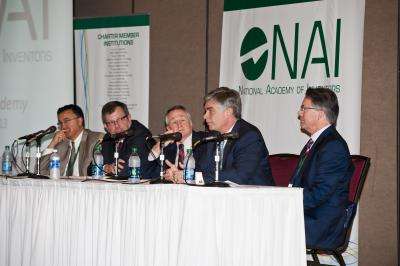Panel says universities should consider patents, IP development in faculty assessments

(Phys.org) —A group of senior university officials suggests it is time to add faculty research activities that translate into patents, licensing and commercialization of products to the traditional model for faculty tenure and career advancement , which for years has been based primarily on research and publication in scientific journals.
The university leaders, from institutions around the nation including a vice president at the University of Alabama at Birmingham, highlight their ideas in "Changing the academic culture: Valuing patents and commercialization toward tenure and career advancement," a paper published in the current issue of The Proceedings of the National Academy of Sciences.
"Over the past several decades, university missions have expanded from teaching and research to include economic development and translating university-based research into real products that benefit society," said lead author Paul R. Sanberg, Distinguished University Professor and senior vice president for Research and Technology at the University of South Florida, and president of the National Academy of Inventors.
The authors suggest that, while research activities that translate to product commercialization should not replace traditional scholarly pursuits such as teaching, mentoring students and publishing research, patent and commercialization activities should be considered equally in decisions related to faculty tenure and academic advancement.
"There is a fundamental disconnect between technology transfer activities and incentives for faculty members in terms of merit raises, tenure and career advancement," said co-author Richard B. Marchase, vice president for Research and Economic Development at UAB. "Beyond the monetary benefit of licensing, which is small in most cases, there is presently little to no benefit to a faculty member's merit raises, tenure and career advancement."
The authors suggest the disconnect can be lessened or eliminated by changing the university rewards culture to include placing value on a faculty member's patents and commercialization activities. If research, patents, licensing and commercialization are valuable to the institution, they should also be of value to the faculty member's academic career.
"The greatness of a university should not be measured by its research grants and contracts alone," wrote the authors. "Greatness is also measured by how the university impacts and changes for the better the world and society at large."
To understand and place proper value on academic research and its potential beneficial outcomes for society and the university, the authors point to the success and impact of university-based technology transfer, the process of transferring university-based scientific findings to another organization, such as a startup company, for further development and commercialization.
UAB enhanced its technology transfer efforts with the 2008 creation of Innovation Depot, a technology center and business incubation program that focuses on developing emerging biotechnology/life science, information technology, engineering, and service businesses. The largest technology incubator in the Southeast, it is a public-private economic development effort, funded by the Birmingham regional business community, the Community Foundation of Greater Birmingham and other leading private foundations, UAB, the City of Birmingham, and Jefferson County.
Innovation Depot currently boasts 90 companies with 540 employees, and has had an impact of $1.5 billion on the Birmingham area over the past five years.
The authors suggest that university-based research can help fill the gap created by the decline of corporate research laboratories, as noted in a 2013 report from the National Research Council of the National Academies. The patent, licensing and commercialization benefits of technology transfer include license income and royalties, access to unrestricted funds for further institutional investment, and increased opportunities for research funding. Additional benefits include increased prestige for the institution and public benefit, as well as helping the institution sustain high levels of scholarship and supporting student success.
"Universities would do well to encourage and support bright young faculty and trainees to build careers that combine research and scholarship—the traditional academic paths to tenure and academic advancement—with translating that research to the market through patents, licenses, and the commercialization of their ideas and products to benefit society," said Marchase.
More information: "Changing the academic culture: Valuing patents and commercialization toward tenure and career advancement," by Paul R. Sanberg et al. www.pnas.org/cgi/doi/10.1073/pnas.1404094111
Journal information: Proceedings of the National Academy of Sciences
Provided by University of Alabama at Birmingham

















